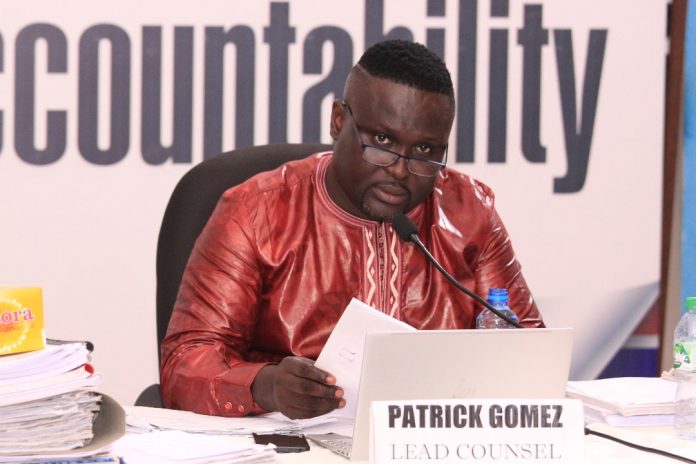Rohey Malick Lowe, Mayor of Banjul City Council, was on Thursday told in no uncertain terms that she had overstepped her legal mandate by assuming roles that did not belong to her, including making financial requests and initiating payments — a responsibility reserved for designated council staff, not elected officials.
“Mayor cannot be a paying-out cashier,” declared Lead Counsel Patrick Gomez during a tense and revealing session of the Local Government Commission of Inquiry.
The Commission was established to probe the financial and administrative conduct of local councils between May 2018 and January 2023. In her testimony, Mayor Lowe was confronted with a series of questionable financial transactions processed in her name or on her instruction by her assistant, Fatou Mbenga.
One such payment involved a voucher of D5,000 intended to support a woman named Jankey and her family. Lowe said the woman had written to her requesting help. Asked by Gomez, “Who decided the amount?” Lowe responded, “I discussed with the CEO for guidance, and they decided how much she should get.” She added, “The CEO advised me on the amount.” Gomez retorted, “Advice is not binding.”
She did not give a direct answer on who exactly fixed the amount, leading Gomez to remark, “The former CEO, Mustapha Batchilly, was a rubber stamp.” He pressed her: “Was there ever an instance when the CEO wrote back rejecting your request?” Lowe said, “The rejected vouchers are more than the approved vouchers.”
She explained that she would first inform the CEO of any intended request and the two would discuss it before a voucher was raised. “The CEO used to reject my request,” she said. Gomez demanded evidence. Lowe admitted: “I was not documenting my interactions with the CEO.”
In another instance, D15,000 was requested by Mbenga on behalf of the Mayor for the rental of chairs and other items. Gomez asked, “How did you arrive at the amount?” Lowe said, “I do not know how much they rent chairs and others. My name was used. I take responsibility.”
Gomez then questioned a more elaborate transaction — a D30,000 voucher for a dinner in honour of the visiting Mayor of Ostend City. The expenses included 3 sheep, 5 crates of canned drinks (D5,000), 20 packets of water (D2,000), a chef (D5,000), kora performers (D5,000), a DJ (D5,000), a kora as a gift (D5,000) and four drums (D12,000).
“The budgeting was done with the participation of the Ostend-BCC project officials,” Lowe said. She added, “Fatou used to make requests in my name, not knowing that the practice was wrong.”
But Gomez was blunt: “The excuse is not justifiable because the law is clear on how council funds are managed. The Mayor was requesting money and making payments, which is the role of a paying-out cashier.”
He continued, “The Mayor cannot be a paying-out cashier.”
Lowe pushed back: “Lead Counsel, you cannot generalise this. The mistake we made in the case of payments to Fatou Mbenga does not mean the Mayor is a paying-out cashier.”
Gomez did not relent: “The payments made to Fatou Mbenga and instructions given by the Mayor were wrong. The Mayor cannot be a paying-out cashier.”
Lowe argued the payments were understood to be impress, or temporary cash advances: “We thought that it was an impress.”
Gomez responded, “The voucher would classify the payments as imprest, but the requests that are raised do not classify it that way. The requester would request ‘payment’ and not ‘impress’.”
He asked: “What do you understand by an imprest?”
Lowe replied: “Monies given to him incidental to his trip.”
Gomez countered: “There were several payments given to the Mayor that were classified as imprest but were not the right accounting procedure. The law states that it should be for emergency purposes, but the visit of the Mayor of Ostend is not an emergency.”
“Where does the fault lie? Is it because of ignorance?” Gomez asked. Lowe replied, “The problem was the choice of words. All payments are classified as imprest. We are still doing the same.”
Gomez handed Lowe the Financial Manual, reading aloud Section 305, which outlines authority for expenditure: “This is telling you that the CEO has the power to authorise expenditure, the Mayor or Chairperson has the power to authorise expenditure, and the Council also has the authority. The Council has the responsibility of coming up with thresholds for the CEO and the Mayor.”
He continued to cite laws on salary payments, procurement procedures, and petty cash systems. “Are you following?” Gomez asked. “Yes,” Lowe replied.
Lowe then shifted blame toward her senior staff: “Lead Counsel, you are talking from the book. I wish what is in the book is what obtains in the council. The powers the CEO and the finance directors have are more than the power of the Mayor.”
Gomez asked: “Why do you say the finance director and the CEO are more powerful than the Mayor? What do they do that you cannot control?”
She said: “The CEO and the finance director can frustrate the efforts of the Mayor, and they can do things that the Mayor may not be aware of. The CEO only provides me with what he wants me to know. If he does not want me to know anything, I won’t know it.”
She added, “In the Banjul City Council, the CEO and the finance director are the ‘Alpha and Omega’. Whatever they want will happen.”
Commission Chairperson Jainaba Bah asked the Mayor to provide evidence that the former finance director, Momodou Camara, took loans from Council funds. Lowe presented documents and accused Camara of conducting transactions without proper authorisation. “He brought a company called Sabs to do revenue collection for the council in my absence and obtained a council resolution,” she said.
She reiterated, “All the requests I made or made in my name, it was the CEO who told me how much I should request.”
Gomez examined another request submitted by Mbenga for D250,000 for NAYConf, of which D50,000 was for refreshments. Lowe said, “The budget was prepared by the NAYConf organisers.”
“Why were you paid?” Gomez asked.
“Yes, this was a mistake on my part, and I admit,” Lowe answered.
Another voucher for D40,000 was raised for a Quranic recitation led by Imam Bai Essa Ngom. Gomez questioned the payment: “It should not have been paid to you.” Lowe conceded: “I agree with you.”
On procurement, Gomez queried a town hall meeting held in Banjul North for which her office managed expenditures.
“Your team is not the procurement unit of the council,” Gomez stated.
“Yes,” Lowe agreed.
“Your team is not the contracts committee of the council,” he continued.
“Yes,” she replied again.
“Why were they doing procurement?”
The Mayor answered that she established the procurement unit during her first term because “there was none at the time.” She admitted, “Any procurement you see between May 2018 and December 2018 was done illegally because there was no procurement unit. It did not follow the legal procurement process.”
Gomez challenged her again, saying the illegal procurement continued beyond 2018. “Yes, that is correct,” the Mayor admitted.
The final issue raised was the LED light procurement from Senegal, which was executed without approval from the Gambia Public Procurement Authority (GPPA). Lowe said, “I only came to know that the GPPA rejected the transaction from this Commission.”
But Gomez cited the testimony of Momodou Camara, former finance director, who said Lowe ordered the transaction to proceed even after the GPPA rejection. Time was up, and she will reappear on July 7.





















